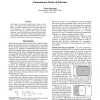Free Online Productivity Tools
i2Speak
i2Symbol
i2OCR
iTex2Img
iWeb2Print
iWeb2Shot
i2Type
iPdf2Split
iPdf2Merge
i2Bopomofo
i2Arabic
i2Style
i2Image
i2PDF
iLatex2Rtf
Sci2ools
105
click to vote
AAAI
2008
2008
Nonmonotonic Modes of Inference
In this paper we investigate nonmonotonic `modes of inference'. Our approach uses modal (conditional) logic to establish a uniform framework in which to study nonmonotonic consequence. We consider a particular mode of inference which employs a majority-based account of default reasoning--one which differs from the more familiar preferential accounts--and show how modal logic supplies a framework which facilitates analysis of, and comparison with more traditional formulations of nonmonotonic consequence.
Related Content
| Added | 02 Oct 2010 |
| Updated | 02 Oct 2010 |
| Type | Conference |
| Year | 2008 |
| Where | AAAI |
| Authors | Victor Jauregui |
Comments (0)

